One of my students in our Torah Mastery course asked me this month the finest question that I’ve ever received over the last five years since Torah Online was founded, and was victorious in my favorite game, “Stump the Rabbi”.
In the first lesson of Torah Mastery I said over a piece from the Ohr Hachaim at the beginning of Sefer Shemos.
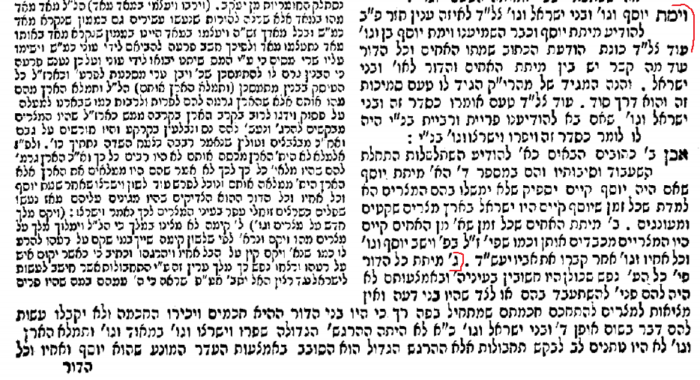
In explaining one of the verses, the Ohr Hachaim wrote that there were several stages that led up to the enslavement of the Jewish people in Egypt. The third stage was the death of all of the 70 people who came with Yaacov to Mitzrayim many years before. These souls were very honored in the eyes of the Mitzrim, and as long as any of them were still alive, the Mitzrim didn’t have the ability to enslave the Jewish people.
So my student told this over to her husband, who said right back, “What is the Ohr Hachaim going to do with Serach Bat Asher, who was one of the seventy that came down to Egypt, and even went out of Egypt with Moshe. This we see in the verse in Bamidbar (26, 46) according to Rashi who writes, “Since she was still alive, that’s why the posuk mentions her.”
Great question, I had no idea what to answer.
I started searching, and I found the Medrash which is mentioned as the source for the words of the Ohr Hachaim, Shemos Raba (1, 8). The Medrash says:

“And the whole generation”: this comes to teach you that as long as any of them were still alive from those that went down to Mitzrayim, they didn’t enslave them…
At first glance, the question on the Ohr Hachaim can be asked on the Medrash as well. In other words, instead of the question being a question on an “acharon”, a commentary who lived only a couple of hundred years ago after the Shulchan Aruch, it could be a question on Chazal themselves, something which requires an answer. You can’t just brush off Chazal, that’s tantamount to apikorsus, see the Ohr Hachaim in Parshat Ki Tavo on the posuk, “ve’samta be’teneh”.
I asked a couple of very very good avraichim who learn with me, no one could answer this, they all shook their head and said, “that’s a nice comment”.
So I put up a sign in our Bais Medrash where hundreds of Torah learners pass through daily, with the story and with the question, and with a request that if anyone knows anything to please enlighten my eyes.
A couple of things sort of happened right away. First a number of people approached me and asked me why do I only ask on the Ohr Hachaim and on the Medrash, why isn’t the question on the posuk itself? Ve’kol Hador Hahu. Kol Hador, that means everyone.
OK. But this bothers me less because I imagine that it would easier to reconcile the posuk than it would be the Ohr Hachaim who speaks out “any one of the seventy souls”. Like for example since Serach lived longer, then that is not called “her generation”, or some such reconciliation.
Then they all pointed out that the same question would be regarding Yocheved. Yocheved was the one who completed the 70 souls, as in Rashi in Parshas Vayigash. And she was certainly still around after the enslavement started, she gave birth to Moshe.
I was trying to do other things there that night, so it’s like this: There is a computer in the Bais Medrash with access to all of these fancy shmancy search tools, so right away someone came up to me with a printout of a page of a sefer Rinat Yitzchak, written by I don’t know who, that quotes that Rav Dovid Soloveitchik (shlita) asked this question on the Rashbam and the Sforno who also explained vekol hador hahu that it’s talking about the 70 people who came to Mitzrayim with Yaacov Avinu.
Rav Soloveitchik answered that since the Seforno explains that the point of the 70 souls still being alive, was that it was a downward struggle spiritually speaking for the Jewish people in Mitzrayim, little by little they were influenced by the morass of Egyptian immorality. As long as the generation of the 70 souls was still around, so then they influenced the Jewish people for the good and did not let them fall so far and so fast. But when they all passed away, even though Yocheved and Serach were still around, still, they didn’t have any more positive influence, and it was as if they were dead from that standpoint, and the Jewish people fell in their spiritual level to be just like the Egyptians.
Nice. But we raised our eyebrows whether such an idea would be adequate to answer the Ohr Hachaim, who explains the passage differently.
Also, it can’t be that this a question that is being asked for the first time in our generation. This is clearly a bavuste kasha that must have been dealt with before.
The next morning at shul one of my friends approached me and told me that he overheard a bunch of people discussing the question, and that the chief of the group had an answer which my friend wasn’t able to grasp, wasn’t able to hear well, and he told me to go ask him.
I waited in anticipation the whole day, and when I finally got to night seder I approached this person, and he told me as follows: There is a Tanaic dispute whether or not Serach bat Asher lived forever or not. And thus there is no attack on the Ohr Hachaim who could be going with the opinion that she didn’t continue living after a normal lifetime.
(Note that this only explains Serach, not Yocheved.)
It’s like this, he explained: There is a very interesting gemara in Bava Basra which states that there were seven specific people that span all of mankind.

Adam Hareishon, Mesushelach saw Adam, Shem saw Mesushelach, Yaacov saw Shem, Amram saw Yaacov, Achiya Hashiloni saw Amram, and Eliyahu saw Achiya, and Eliyahu is still alive.
And on this passage Tosfos comments that this Tana must hold that Eliyahu was not Pinchas, because then it could come out much less than seven, because Ya’ir the son of Menashe saw Yaacov and Pinchas. And additionally he must hold that Serach Bat Asher did not live forever for the same reason.
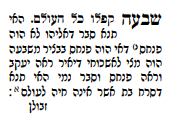
So, said the Rav, the Ohr Hachaim can be speaking according to this Tana in Bava Basra, and therefore the question falls away.
I was curious, therefore I looked into it, because according to the above, Rashi on the posuk in Bamidbar can only be going according to one opinion that she lived forever. But according the Tana in Bava Basra you can’t say what Rashi is saying over there. Are there others that learn the verse differently?
So there are two subjects that catch the attention of the mefarshei Rashi and the other mefarshei HaTorah over there. One is that this list are the ones that received portions in Eretz Yisroel, as the posuk says afterwards, “Le’eileh Teichaleik Ha’aretz…”, and if so was Serach a lone daughter like the bnos Tzelafchad, or not? It would seem that Asher also had sons, so what is she being mentioned for? A second issue, which actually connects with the first issue, is who was Serach Bat Asher? The Targum Onklus renders that she was his step-son, the son of his wife.
At any rate, not to burden the reader, suffice it to say that the Ramban learns at the end of the piece, that the way that he sees it in the simple reading of the text, he learns that Serach was gone already a while back, and it is her descendants that are being referred to in the posuk.
That was answer number two.
Number three, one of my good buddies likes to make use of the search function of the computer in the Bais Medrash, and he found this question asked by none other than the Ohr Hachaim himself!
In Parshas Vayigash, Braisheis (46, 7): the psukim before and after talk about how Yaacov brings himself and all of his descendants to Egypt.
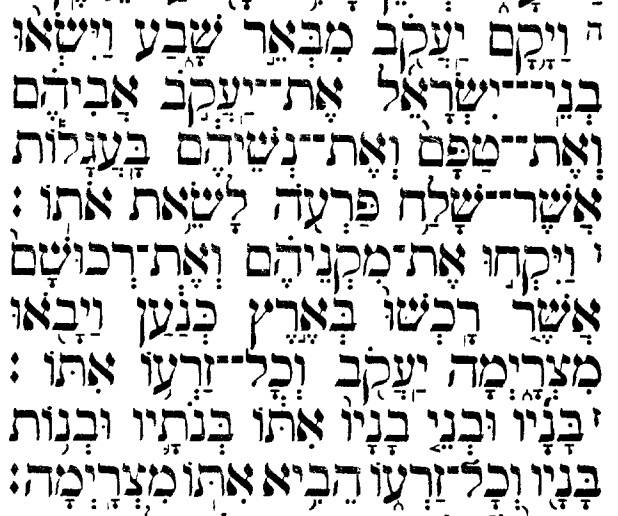
The Ohr Hachaim asks basically two questions. 1) the whole verse is redundant. The previous posuk says, Yaacov and all of his seed. What does this verse add? 2) Why does the verse split the mentioning of his sons and grandsons from the mentioning of his daughters and granddaughters with the word “eito”, with him?
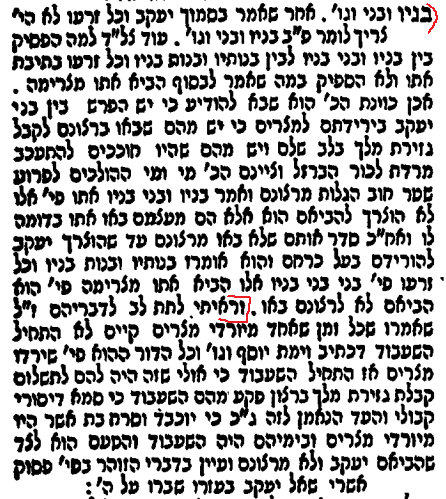
And he answers that the posuk is coming to hint to us that there was a distinction amongst Yaacov’s offspring. Some of them were Eito, with him, meaning that they were going down to Mitzrayim knowing fully and accepting what they were getting into, into the slavery and bondage that was foretold by G-d Almight-y to Avraham Avinu in the bris bain habesarim.
But others of Yaacov’s descendants didn’t want to or weren’t ready to accept upon themselves slavery, and the only reason that they came with Yaacov is that Yaacov brought them with him.
With this, says the Ohr Hachaim hakadosh, I can understand a difficulty that I have. That Chazal said that as long as any of those that went down to Mitzrayim was alive the slavery didn’t start, but when they were gone, then the slavery started.
And why was this? Says the Ohr Hachaim, this was as a payment for that which they were willing to go down willingly to accept the decree of the King. They suffered enough by that which they were ready, willing, and able to go through with it.
And a proof for this is that Yocheved and Serach were also amongst those that went down to Mitzrayim and the subsequent slavery was in their time. But the answer is, that since they were brought by Yaacov, and didn’t go willingly to fulfill the bris bain habesarim, therefore they didn’t have this merit, and when the time for the slavery came, they were caught up in it as well.
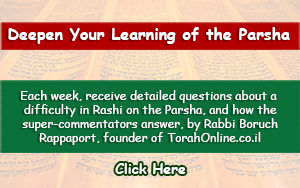

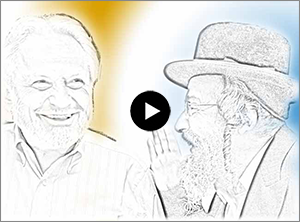


Leave A Response